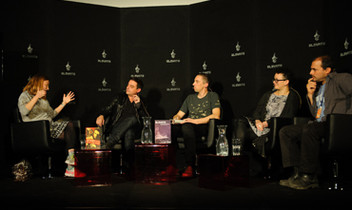Creative Response is the theme of this year's Elevate festival. Fittingly, this was a vast, sprawling session that spread over two hours, with six guests and more than a dozen contributions from the audience. Unfortunately, that means this blog post can only be a short introduction to a small part of the stimulating discussion.
Creative response is the brain-child of film-maker and writer Antonino D'Ambrosio. He starts the session by trying to capture some of the main ideas behind the concept.
“It's how we've survived as human beings since the beginning of time,” Antonino says. “It's a rejection of the things that hold us back and advancing systems that bring people together. And you do that through creativity, not just film, music, art, photography, but economics, science, in every way we can break down these barriers socially, politically, culturally.”
For many on the panel, Antonino's definition of “creative response” was not one they had come across, but the ideas were, of course, already embedded in their personal creative philosophies.
DJ Ripley finds the idea “very appealing”, but makes the point that not everyone is struggling for survival – under the current system, some people are doing very well, often through exploiting others. For her, therefore, “creative response is particularly rooted in people whose survival is and has been challenged right now.” As a DJ from New York, Ripley is aware of her great privilege and must herself consciously resist the temptation to exploit the musical resources of other cultures, which she describes as a “delightful buffet” - a short step from the cruel domination of colonialism.
Cultural researcher Elisabeth Mayerhofer picks up on Antonino's comments about creative response being a tool that brings people together. Tracing the history of the artist in the western world, she makes the point that eighteenth century emergence of The Artist was “very intertwined with the concept of capitalism”. It was only when capitalism emancipated the artist from feudalism, through the financial independence afforded by the market and intellectual property rights, that they were able to rise out of the community and into the position of cultural Genius.
Today, however, Elisabeth sees the slow erosion of the role and self-perception of the artist as genius. New forms of intellectual property, including the Creative Commons, are acknowledging that everything is created out of what has gone before. “The artist is moving back into society,” Elisabeth says. “In the end, the production and the consumption of art both have a very strong aspect of collectivity. You can't think of arts without community.”
Mike Bonanno from activist collective The Yes Men tells a story that illustrates what's possible when a little creativity is stirred into the pot. He was in Australia at a conference for accountants - “These are people who are not usually associated with creativity,” Mike notes - and announced the shutting down of the World Trade Organisation, to be replaced by the Trade Regulation Organisation. He wasn't expecting what came next, however.
“They were so thrilled with the idea that the framework had changed and they'd be able to do something good with all of their expertise that, without us asking them, they formed working groups at the luncheon that followed the speech and started to rebuild the World Trade Organisation themselves – and they started by redesigning the logo.”
When the laughter falls away, Mike tells how these high-powered accountants, who'd spent their lives off-shoring money for the super rich, discussed where they could site the headquarters of this new organisation so that the least developed nations could have full representation.
“The point is that lifting that weight gave them this moment where they suddenly felt incredibly creative and spontaneously became these incredibly creative accountants.”
For Elevate moderator Daniel Erlacher, this perfectly encapsulates creative response at its most powerful: activism combined with creativity to create a new world.
